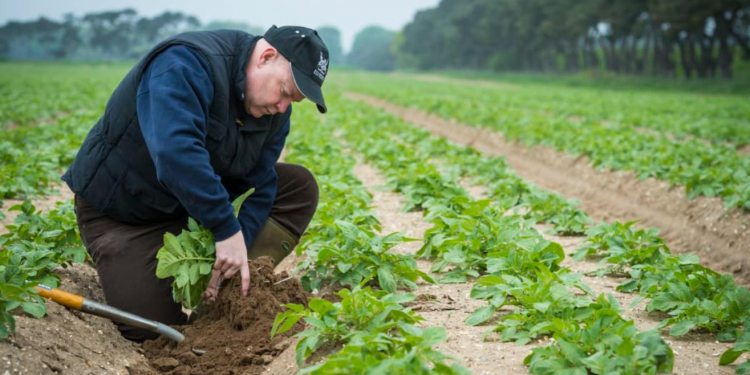Consumers’ expectations of the “perfect potato” may need to change as the food industry drives towards more climate-friendly agriculture.

That was the view from a major East Anglian grower after frozen chips giant McCain announced it will source all its potatoes from “regenerative” farms by 2030. This could include measures such as disturbing the soil less during cultivation to keep carbon locked into the ground, reducing usage of artificial fertilisers, and using cover crops to avoid erosion and make soils more resilient to weather extremes.
Andrew Francis is farms director at the 22,500-acre Elveden Estate near Thetford, one of the region’s largest producers of potatoes for McCain. He said the estate is already on a journey of “constant progression” towards more efficient and environmentally-conscious agriculture – including exploring ways to improve soil health, minimise synthetic chemicals and field operations, and reduce its water footprint.
But he said the wider evolution towards regenerative agriculture may mean customers and consumers need to accept less uniform or more expensive potatoes. “The whole industry is currently talking about regenerative agriculture, so this is something that should be on everybody’s radar,” he said.
“But I see it as a natural progression from where we currently are. Our business DNA is about constant improvement, constant refinement and challenging ourselves to be better producers, while continuing to enhance the ecology around us.
“We are all one team, looking to do the right thing for the customer, the consumer, and society at large.
“We are all on a journey, but where we need to build on this relationship is how we reach the destination. Some of the barriers to change can be quite large steps, and could mean large capital investments for a new processing system or a new piece of machinery. Some of this transition can be quite disruptive and quite risky, and without a partnership to act as a failsafe, some barriers could become business critical.
“As an example, we could reduce the amount of nitrogen [fertiliser], but if the impact is our potatoes don’t grow as big, then the consumer’s expectation of a certain size and specification would need to change. If they are prepared to accept a different potato in a different shape it opens up what we can do on the production end, because we are no longer trying to produce the ‘perfect potato’.”
“We would not compromise our food quality or environmental standards, but a disproportionate amount of time, effort and input is put into what our food looks like, so if the marketplace was prepared to accept an ‘imperfect’, variable product then a lot of resources could be looked at completely differently. But everyone needs to be on the same page.” McCain, the world’s largest manufacturer of frozen potato products, said it would follow regenerative farming principles to cut the environmental impact of its operations.
Chief executive Max Koeune said: “If we don’t transform the way we grow food, the whole system is at risk of suffering irreparable damage. As a global leader in food production, McCain has a responsibility to reimagine the way we grow a potato in a way that is beneficial for both the planet, and the communities where we operate.”

Together with its long-standing potato partner McCain, it is launching the Sustainable MacFries Fund, providing more than £1m in grants to British potato growers to help improve water and soil sustainability. Around 41% say that supporting local farmers and growers is important to them, while 35% say they want to eat out more to support local food providers and farmers.






